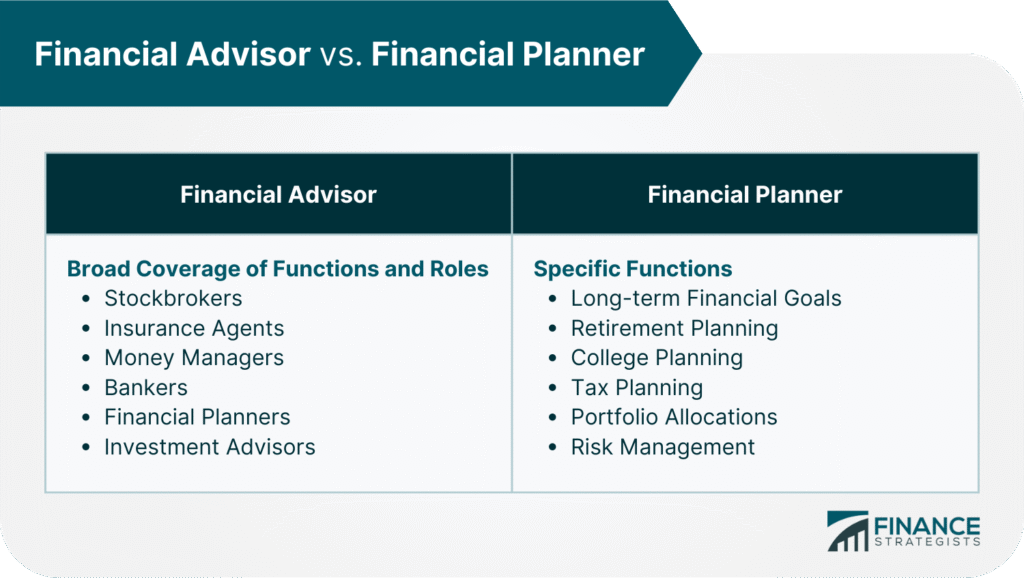Financial Planner vs. Financial Advisor: When it comes to managing money, many people turn to professionals for guidance—but the terms financial planner and financial advisor are often used interchangeably. While both roles involve helping clients achieve financial stability, there are important differences in their qualifications, services, and scope of work.
Understanding these differences is essential when deciding which professional best suits your needs. Whether you’re planning for retirement, saving for a child’s education, managing investments, or protecting your estate, choosing the right expert can make a significant impact on your long-term financial success.
Scott Bishop, CPA, PFS, and CFP at Avidian Wealth Solutions in Houston, notes:
In short, every financial planner is a financial advisor, but not every financial advisor is a financial planner. Knowing the difference helps you select the right fit for your financial goals.
Takeaways
- Financial planners focus on creating long-term strategies for individuals and families, including retirement, education savings, estate planning, and budgeting.
- Financial advisors is a broader term that includes brokers, money managers, insurance agents, tax professionals, and bankers.
- Advisors working with the public generally need to pass the Series 65 licensing exam, while planners often hold specialized certifications like CFP, CFA, or ChFC.
- Before choosing, always verify credentials, ask about fees, and ensure the services align with your personal financial needs.
What Is a Financial Planner?
A financial planner helps clients develop strategies to achieve long-term financial objectives. Their role often includes:
- Budgeting and saving plans
- Investment strategy design
- Retirement planning
- Education savings goals
- Estate and wealth transfer planning
Qualifications and Certifications
The term “financial planner” isn’t regulated, meaning anyone can technically use the title. However, reputable planners usually hold at least one of these professional designations:
- Certified Financial Planner (CFP): The most respected certification, requiring rigorous education, examinations, and continuing education.
- Chartered Financial Analyst (CFA): Focused on investment management and analysis, often serving institutions but also individuals.
- Chartered Financial Consultant (ChFC): Specializes in insurance, estate planning, and comprehensive financial strategies.
Regulation and Oversight
Financial planners are regulated by the services they provide. For instance, those who manage investments must register with the U.S. Securities and Exchange Commission (SEC) or state regulators.
What Is a Financial Advisor?
A financial advisor is a broader category of professional who offers guidance in various aspects of personal and institutional finance. Unlike planners, advisors may focus on specific financial products or transactions.
Core Services Offered
Financial advisors can provide:
- Investment management and portfolio allocation
- Securities trading and brokerage services
- Insurance and risk management
- Banking and lending solutions
- Tax planning strategies
- Real estate investment guidance
- General money management
Read about: CRD6 – Article 21c and Its Impact on Third Country Banks and the International Finance Sector
Licensing and Requirements
Unlike “financial planner,” the title financial advisor is subject to stricter licensing requirements. Most advisors must pass the Series 65 exam to work with the public. Additional licenses may be required depending on services:
- Securities licenses for investment advisors
- Insurance licenses for those selling policies
- Federal or state registration for compliance

Types of Financial Advisors
The term covers many roles, including:
- Investment advisors
- Stockbrokers
- Insurance agents
- Money managers
- Estate planners
- Bankers
- Tax professionals
Advisors may earn income through commission, fees based on assets under management, or hybrid models. Understanding how they’re compensated is crucial to avoid conflicts of interest.
Financial Planner vs. Financial Advisor: Differences
| Feature | Financial Planner | Financial Advisor |
|---|---|---|
| Focus | Long-term strategies (retirement, education, estate planning) | Broad financial services (investments, insurance, banking, taxes) |
| Credentials | CFP, CFA, ChFC (optional but recommended) | Series 65 required + other licenses depending on role |
| Regulation | Based on services provided (SEC or state) | Heavily regulated by FINRA, SEC, and state authorities |
| Clients | Individuals and families, sometimes small businesses | Individuals, families, institutions, and corporations |
| Compensation | Fee-based or commission | Commission, AUM-based fees, or hybrid models |
Advisor vs. Adviser: Is There a Difference?
Legally, “advisor” and “adviser” are used interchangeably in the financial industry. The SEC often uses “investment adviser,” while firms frequently prefer “financial advisor.” For clients, both mean the same thing, though “adviser” may sound more formal.
Also raed: OPPO F31 Series First Sale: Built for India’s Festive Hustle
Conclusion
The choice between a financial planner and a financial advisor comes down to your personal goals:
- If you’re looking for long-term guidance on retirement, education savings, or estate planning, a financial planner (preferably a CFP) is often the best fit.
- If you need investment management, insurance, or broader financial products, a financial advisor may be more suitable.
- Many professionals hold multiple certifications, meaning they may act as both planner and advisor, depending on client needs.
Before hiring, always:
- Verify certifications and licenses.
- Ask about compensation models.
- Ensure their services align with your financial objectives.
- Compare a few professionals before making a decision.
Making the right choice today can help you secure a stable financial future, avoid costly mistakes, and build confidence in your money management strategy.



Pingback: Common Vitamin Found in Nuts and Seeds
Pingback: PSUs Flock to Debt Market as Quarter-End Funding Needs and Softer Yields Drive Bond Issuances – Texas Headliners